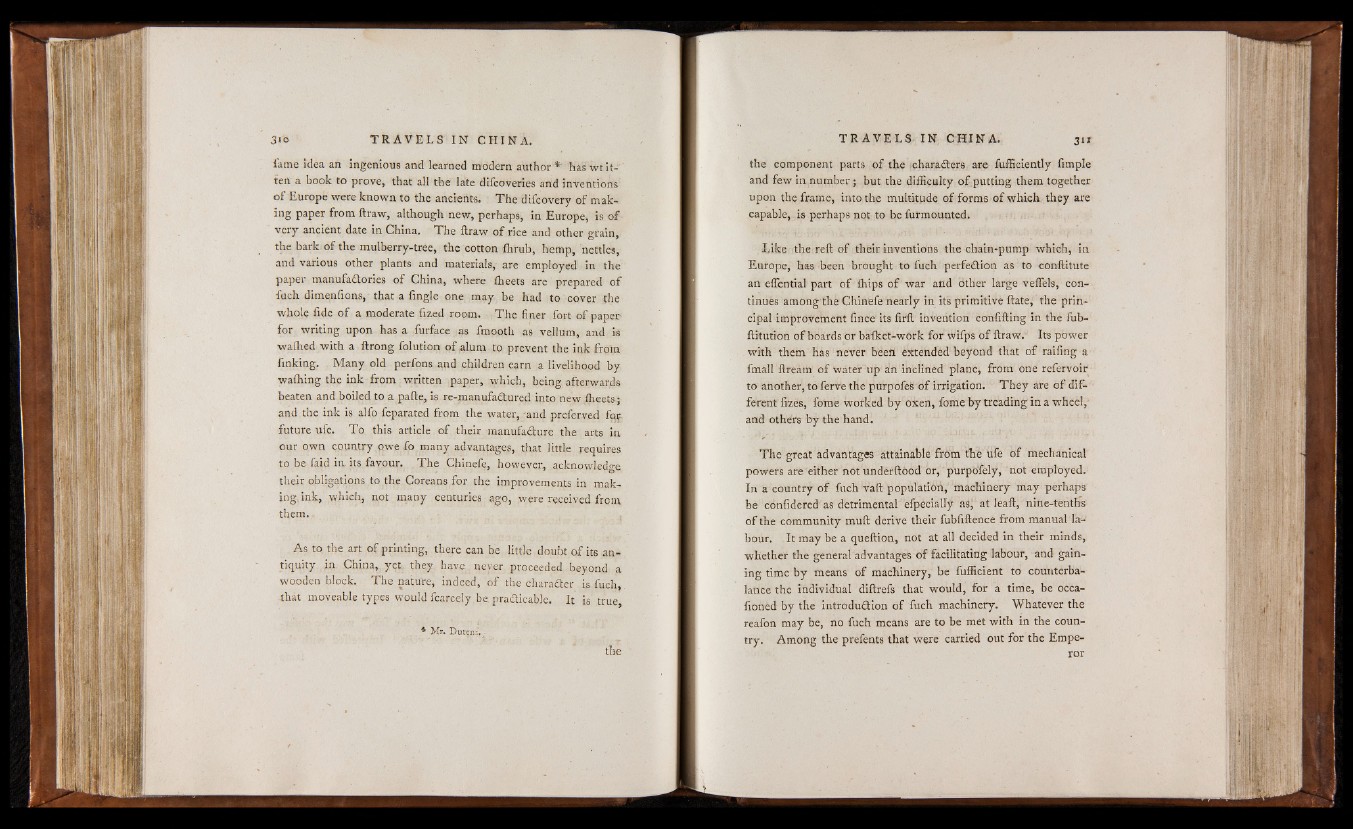
lame idea an ingenious and learned modern author * has w r itten
a book to prove, that all the late difcoveries and inventions
o f Europe were known to the ancients. The difcovery o f mak-
ing paper from ftraw, although new, perhaps, in Europe, is o f
very ancient date in China. The itraw o f rice and other grain,
the bark o f the mulberry-tree, the cotton ihrub, hemp, nettles,
and various other plants and materials, are employed in the
paper manufactories o f China, where iheets are prepared o f
fuch dimenfions,-that a fingle one may be had to cover the
whole fide o f a moderate fized room. The finer fort o f paper
for writing upon has a furface as fmooth as vellum, and is
waihed with a ftrong folution o f alum to prevent the ink from
finking. . Many old perfons and children earn a livelihood by
waihing the ink from ; written paper, which, being afterwards
beaten and boiled to a pafte, is re-manufaCtured into new iheets ;
and the ink is alfo feparated from the water, 'and preferved fat,
future ufe. T o this article o f their manufacture the arts in
our own cpuntry owe fo many advantages, that little requires
to be faid in its favour. The Chinefe, however, acknowledge,
their obligations to,the Coreans for the improvements in making,
ink, -which, not many centuries ago, were received from
them.
As to the art o f printing, there can be little doubt o f its antiquity
in China,, yet. they have never proceeded beyond a
wooden block. The nature, indeed, o f the character is fuch,
that moveable types would fcarcely be. practicable. It is true,
* Mr. Dutens,
the
the component parts o f the .characters are fufficiently fimple
and few in number ; but the difficulty o f putting them together
upon the frame, into the multitude o f forms o f which they are
capable, is perhaps not to be furmounted.
Like the reft o f their inventions the chain-pump which, in
Europe, has been brought to fuch perfection as to conftitute
an eflential part o f ihips o f war and other large vefiels, continues
among the Chinefe nearly in its primitive ftate, the principal
improyetnefit fince its firft invention Confifting in the fub-
ftitution o f boards or baiket-work for wifps o f ftraw." Its power
with them has never beett extended beyond that o f railing a
fmall ftream o f water up an inclined plane, from one refervoit
to another, to ferVe the purpofesi o f irrigation. T h e y are o f different
fizes, fome worked by oxen, fame by treading in a wheel,-
and others by the hand.
The great advantages attainable from the ufe o f mechanical
powers are either not underftood or, purpofely, not employed.
In a country o f fuch vaft populatid'U, machinery may perhaps
be confidered as detrimental efpecially as,1 at leaft, nine-tenths
o f the community muft derive their fubfiftence from manual la-1
bour. It may be a queftion, not at all decided in their minds,
whether the general advantages o f facilitating labour, and gaining
time by means o f machinery, be fufficient to counterbalance
the individual diftrefs that would, for a time, be occa-
fioned by the introduction o f fuch machinery. Whatever the
reafon may be, no fuch means are to be met with in the country.
Among the prefents that were carried out for the Emperor